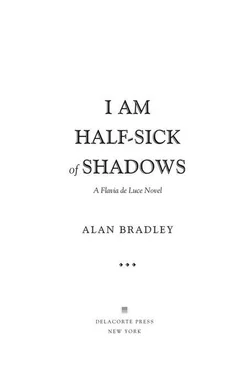Alan Bradley - I Am Half-Sick of Shadows
Здесь есть возможность читать онлайн «Alan Bradley - I Am Half-Sick of Shadows» весь текст электронной книги совершенно бесплатно (целиком полную версию без сокращений). В некоторых случаях можно слушать аудио, скачать через торрент в формате fb2 и присутствует краткое содержание. Жанр: Старинная литература, на английском языке. Описание произведения, (предисловие) а так же отзывы посетителей доступны на портале библиотеки ЛибКат.
- Название:I Am Half-Sick of Shadows
- Автор:
- Жанр:
- Год:неизвестен
- ISBN:нет данных
- Рейтинг книги:5 / 5. Голосов: 1
-
Избранное:Добавить в избранное
- Отзывы:
-
Ваша оценка:
- 100
- 1
- 2
- 3
- 4
- 5
I Am Half-Sick of Shadows: краткое содержание, описание и аннотация
Предлагаем к чтению аннотацию, описание, краткое содержание или предисловие (зависит от того, что написал сам автор книги «I Am Half-Sick of Shadows»). Если вы не нашли необходимую информацию о книге — напишите в комментариях, мы постараемся отыскать её.
I Am Half-Sick of Shadows — читать онлайн бесплатно полную книгу (весь текст) целиком
Ниже представлен текст книги, разбитый по страницам. Система сохранения места последней прочитанной страницы, позволяет с удобством читать онлайн бесплатно книгу «I Am Half-Sick of Shadows», без необходимости каждый раз заново искать на чём Вы остановились. Поставьте закладку, и сможете в любой момент перейти на страницу, на которой закончили чтение.
Интервал:
Закладка:
Daffy’s a romantic, but I knew what she meant: We were fleeting images of Harriet.
Perhaps that was why Father spent his days and nights among his postage stamps: surrounded by thousands of companionable, comforting, unquestioning countenances, not one of which, like those of his daughters, mocked him from morning till night.
I had thought about these things until my brains were turning blue, but I still didn’t know why my sisters hated me so much.
Was Buckshaw some grim training academy into which I had been dumped by Fate to learn the laws of survival? Or was my life a game, whose rules I was supposed to guess?
Was I required to deduce the secret ways in which they loved me?
I could think of no other reason for my sisters’ cruelty.
What had I ever done to them?
Well, I had poisoned them, of course, but only in minor ways—and only in retaliation. I had never, or at least hardly ever, begun a row. I had always been the innocent—
“No! Watch it! Watch it!”
A scream went up outside the window—harsh at first, and agonized, then quickly cut off. I flew to the window and looked out to see what was happening.
Workers were flocking round a figure that was pinned against the side of a lorry by an upended packing case.
I knew by the red handkerchief at his neck that it was Patrick McNulty.
Down the stairs I ran, through the empty kitchen and out onto the terrace, not even bothering to throw on a coat.
Help was needed. No one among the ciné crew would know where to turn for assistance.
“Keep back!” one of the drivers said, seizing me by the shoulders. “There’s been an accident.”
I twisted away from him and pressed in for a closer look.
McNulty was in a bad way. His face was the color of wet dough. His eyes, brimming with water, met mine, and his lips moved.
“Help me,” I think he whispered.
I put my first and fourth fingers into the corners of my mouth and blew a piercing whistle: a trick I had learned by watching Feely.
“Dogger!” I shouted, followed by another whistle. I put my heart and soul into it, praying that Dogger was within earshot.
Without taking his eyes from mine, McNulty let out a sickening gasp.
Two of the men were heaving at the crate.
“No!” I said, louder than I had intended. “Leave it.”
I had heard on the wireless—or had I read it somewhere?—about an accident victim who had bled to death when a railway crane had been moved away too soon from his legs.
To my surprise, the larger of the men nodded his head.
“Hold on,” he said. “She’s right.”
And then Dogger was there, pushing through the gathering crowd.
The men fell back instinctively.
There was an aura about Dogger that brooked no nonsense. It was not always in evidence—in fact, most of the time, it was not.
But at this particular moment, I don’t think I had ever felt this power of his—whatever it was—so strongly.
“Take my hand,” Dogger told McNulty, reaching between the lorry and the packing case, which was now teetering precariously.
It seemed to me an odd—almost biblical—thing to do. Perhaps it was the calmness of his voice.
McNulty’s bloodied fingers moved, and then entwined themselves with Dogger’s.
“Not too hard,” Dogger told him. “You’ll crush my hand.”
A sick, silly grin spread across McNulty’s face.
Dogger unfastened the top half of McNulty’s heavy jacket, then worked his hand slowly into the sleeve. His long arm slid along McNulty’s arm, feeling its way, inch by inch along the space between the upended case and the lorry.
“You told me you were master of many trades, Mr. McNulty,” Dogger said. “Which ones, in particular?”
It seemed rather an odd question to ask, but McNulty’s eyes shifted slowly from mine to Dogger’s.
“Carpentry,” he said through gritted teeth. It was easy to see that the man was in terrible pain. “Electrical … plumbing … drafting …”
Cold sweat stood out in globules on his brow.
“Yes?” Dogger asked, his arm steadily at work between the heavy box and the lorry. “Any more?”
“Bit of tool making,” McNulty went on, then added, almost apologetically, “I have a metal lathe at home …”
“Indeed!” Dogger said, looking surprised.
“… to make model steam engines.”
“Ah!” Dogger said. “Steam engines. Railway, agricultural, or stationary?”
“Stationary,” McNulty said through gritted teeth. “I fit them up with … little brass whistles … and regulators.”
Dogger removed the handkerchief from McNulty’s neck, twisting it quickly and tightly about the upper part of the trapped arm.
“Now!” he said briskly, and a hundred willing hands, it seemed, were suddenly gripping the packing case.
“Easy, now! Easy! Steady on!” the men told one another—not because the words were needed, but as if they were simply part of the ritual of shifting a heavy object.
And then quite suddenly they had lifted the crate away with no more effort than if it had been a child’s building block.
“Stretcher,” Dogger called, and one was brought forward instantly. They must carry these things with them wherever they go , I thought.
“Bring him into the kitchen,” Dogger said, and in less time than it takes to tell, McNulty, wrapped in a heavy blanket, was raising himself on his good elbow from the kitchen floor, sipping at the cup of hot tea that was in Mrs. Mullet’s hand.
“Chip-chip,” he said, giving me a wink.
“And now, Miss Flavia,” Dogger said, “if you wouldn’t mind giving Dr. Darby a call …”
“Um,” Dr. Darby said, fishing with two fingers for a crystal mint in the paper bag he always carried in his waistcoat pocket.
“Let’s get you to the hospital where I can have a decent look at you. X-rays, and all that. I’ll take you myself, since I’m going that way anyway.”
McNulty was now getting up painfully from a chair at the kitchen table, his arm and hand in a sling, bandaged from shoulder to knuckles.
“I can manage,” he growled, as many hands reached out to help him.
“Put your arm round my shoulder,” Dr. Darby told him. “The good people here will understand there’s nothing in it.”
Crammed together in a corner of the kitchen, the men from the film studio laughed loudly at this, as if the doctor had made a capital joke.
I watched as McNulty and Dr. Darby moved cautiously through to the foyer.
“Now we’re for it,” one of the men grumbled when they had gone. “How’re we to get on without Pat?”
“It’ll be Latshaw, then, won’t it?” said another.
“I suppose.”
“God help us, then,” said the first, and he actually spat on the kitchen floor.
Until that moment, I hadn’t noticed how cold I was. I gave a belated shiver, which didn’t escape the notice of Mrs. Mullet as she came bustling in from the pantry.
“Upstairs with you, dear, and into an ’ot bath. The Colonel’ll be fair cobbled to come ’ome and find you been out gallivantin’ in the snow nearly naked, so to speak. ’E’ll ’ave Dogger’s and my ’eads on a meat platter. Now off you go.”
• FOUR •
AT THE BOTTOM OF the stairs, I was taken with a sudden but brilliant idea.
Even in summer, taking a bath in the east wing was like a major military campaign. Dogger would have to lug buckets of water from either the kitchen or the west wing to fill the tin hipbath in my bedroom, which would afterwards have to be bailed out, and the bathwater disposed of by dumping it down a WC in the west wing or one of the sinks in my laboratory. Either way, the whole thing was a pain in the porpoise.
Читать дальшеИнтервал:
Закладка:
Похожие книги на «I Am Half-Sick of Shadows»
Представляем Вашему вниманию похожие книги на «I Am Half-Sick of Shadows» списком для выбора. Мы отобрали схожую по названию и смыслу литературу в надежде предоставить читателям больше вариантов отыскать новые, интересные, ещё непрочитанные произведения.
Обсуждение, отзывы о книге «I Am Half-Sick of Shadows» и просто собственные мнения читателей. Оставьте ваши комментарии, напишите, что Вы думаете о произведении, его смысле или главных героях. Укажите что конкретно понравилось, а что нет, и почему Вы так считаете.











